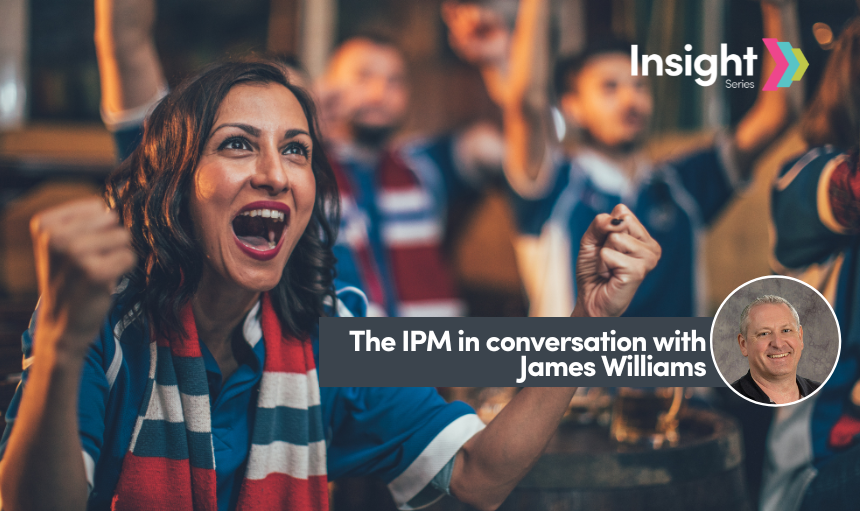
In conversation James Williams
Promotional Marketing in Sports Partnerships and Sponsorship Activations
Industry expert James Williams sits down with the IPM to discuss the role of promotional marketing in sports partnerships and activations
7th August 2023
We are well and truly underway with another exciting summer of sport, Wimbledon, The Ashes, Rugby World Cup and now the Women’s World Cup. Brand partnerships and sponsorship activations have continued to be a popular pursuit, underpinned by rising popularity and access to all these sports.
This month The IPM sat down with industry expert James Williams to discuss the changing trends in sports partnerships and activations. Looking at how promotional marketing continues to play a pivotal role in driving brand loyalty and ROI.
James, boasts a wealth of industry experience having been General Manager and Vice President at the Tokyo 2020 Olympic and Paralympic games for Coca-Cola, as well as Director of Marketing and Sponsorship for Coca-Cola at the Rio 2016 games. Prior to his Olympic experience, James has been heavily involved in sports from the Football League, FIFA World Cup to the Rugby World Cup.
The IPM – James, welcome to the IPM. We are delighted to have you here. Sports and brand partnerships are hugely popular and the growth and access to such a broad range of sports these days is truly opening up more and more partnership/sponsor opportunities. Have you noticed any changing trends in partnerships over the years?
James – Yes, you are really starting to see this evolution from the traditional hardcore, old-guard type of sports partnerships, there is a difference in how brands are approaching partnerships and key topics such as social impact being a priority and motivator. There is still the element of needing to secure brand awareness and reach new audiences, but you see the success that the likes of Barclays had with women’s football and how balancing exposure with driving positive change is of great importance. There is this change and evolution which is great, however, I still think there is a lot that can be done.
The IPM – From your experience, what do you think makes a successful sport & brand partnership?
James – For me, it’s always been about shared values and shared objectives. Ultimately there are always going to be objectives that you want to achieve as a brand or as a rights holder, but where it really works is when you’re both coming at it from the same place, finding complementary objectives. Consumers are a lot more value-driven and by that, I mean personal values, awareness of social impacts and driving positive change. When you can get that authentic mix of values you see really powerful partnerships delivering for both sides. You essentially put the contract away and you both go and solve problems together and that’s where you get the real powerful piece.
The IPM – What would you say then are the fundamental elements of a compelling marketing campaign within sports and brand partnerships?
James – There are two things that I always say, one is – clarity on objectives, what, why, when, who, how. Bring crystal clear on why you are doing what you’re doing. The other is about integration. I don’t know why but sometimes in the corporate world silos just seem to emerge, so for me, it’s about how we get away from that and truly connect all the dots. Putting a real emphasis on integrating with all areas of the business, there is the marketing piece, commercial, operations etc so you have a clear line of sight as to how all these areas work, there is commonality across the campaign, consistency in tone, then even looking at how it translates internally, ask how you utilise some of these great sporting partnerships and events to inspire your teams. The whole reason we talk about high-performing teams in the workplace is because it came from sports. Conclusively, be clear about what it is you want to achieve and ensure it’s fully integrated into every element of the business, that’s where you’re going to maximise your ROI, maximise your benefit and get the most success.
The IPM – How do you think the role of promotional marketing plays a part in the wider marketing mix in terms of driving success?
James – From a purely brand point of view you’ve got rates of sale, depending on which category you are working on, it’s going to drive sales, adoption, awareness and promotional marketing plays into all those elements depending on how you want to do it.
But from a fan point of view, it gets you that bit closer. Promotional marketing for me is the closest the consumer can get to the brand, whether that be through tickets, signed items, free products etc all these elements allows promotional marketing to make the brand/fan relationship closer, more so than what you can do with a TV ad. Promotional Marketing is touching, feeling, engaging and being a part of it, so it is that kind of experiential piece that plays a massive part in it.
The IPM – You mentioned about sports sponsorships being a big ticket, big cost item. How would you suggest smaller businesses with smaller budgets might be able to get involved?
James – I’m never going to be an advocate for it but there is that element of ambush marketing which is popular during major sporting events. But the other side of it is being crystal clear about what you want, and you are seeing a lot of big sporting rights holders and brands saying, I don’t need the big ticket items, actually, I just want to do this, or I just want to engage with this audience, this community etc. There is so much growth in sport now, we talk about netball, hockey, table tennis, and there are so many sports now that as long as you get it right with what you are trying to do you can find the right partnership that is attainable.
Right now finances across the board are challenging, so there are potentially some deals to be made. But you might not want to go directly down the rights holder route, you might want to look at partnerships with specific athletes. I think this is one of the great things about women’s sports, the accessibility to partner with such amazing athletes and get a lot of value back from it due to its continued growth and popularity, create content, and engage with communities. There just appears to be a lot more co-creation in these partnerships than what you would get at a rights holder level or with the likes of Premier League players. I think that is where the opportunity really lies with some of the new sports and the new areas.
The IPM would like to thank James for taking time to discuss this topic. If you would like to get involved in the IPM Insight or Webinar Series please contact emmak@theipm.org.uk.
News
Agencies Hail CORE A Game-Changer for Experiential Insights
Agencies Hail CORE A Game-Changer for Experiential Insights. Secure 1 weeks access for non-IPM members.
Beyond the Rainbow: Growing Your Brand with Pride
Discover how brands can genuinely support the LGBTQIA+ community at Pride 2024.
Plunge into a Summer Review of ASA Promotion Rulings 2024
Dive into our Summer Review of ASA Promotion Rulings 2024.





